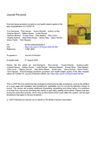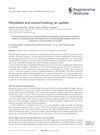 4809 citations,
January 2004 in “Fertility and Sterility”
4809 citations,
January 2004 in “Fertility and Sterility” The 2003 consensus updated PCOS diagnosis criteria and highlighted increased risks of diabetes and heart disease for those affected.
 4025 citations,
December 2003 in “Human Reproduction”
4025 citations,
December 2003 in “Human Reproduction” The 2003 consensus updated PCOS diagnosis criteria and linked PCOS to higher risks of diabetes and heart problems, recommending lifestyle changes to lower these risks.
 2295 citations,
August 2012 in “The international journal of transgenderism/International journal of transgenderism”
2295 citations,
August 2012 in “The international journal of transgenderism/International journal of transgenderism” The guidelines recommend informed consent for gender-affirming treatments and stress the importance of personalized, culturally sensitive care for transgender individuals.
 1533 citations,
October 2008 in “Endocrine reviews”
1533 citations,
October 2008 in “Endocrine reviews” Mice without the vitamin D receptor have bone issues and other health problems, suggesting vitamin D is important for preventing various diseases in humans.
 926 citations,
June 2010 in “BMC Medicine”
926 citations,
June 2010 in “BMC Medicine” Polycystic ovary syndrome is a complex condition that affects women's mental, reproductive, and metabolic health throughout their lives.
 737 citations,
August 2020 in “Journal of Infection”
737 citations,
August 2020 in “Journal of Infection” Many COVID-19 survivors experience long-term symptoms but still report satisfactory quality of life and return to work.
 581 citations,
February 1998 in “The American Journal of Medicine”
581 citations,
February 1998 in “The American Journal of Medicine” Herbal remedies can cause adverse effects and need more safety research.
 414 citations,
August 2005 in “The Journal of Clinical Endocrinology and Metabolism”
414 citations,
August 2005 in “The Journal of Clinical Endocrinology and Metabolism” Polycystic ovary syndrome costs the U.S. over $4 billion a year, mainly from treating related health issues.
 301 citations,
February 2019 in “Nature Communications”
301 citations,
February 2019 in “Nature Communications” The research found that different types of fibroblasts are involved in wound healing and that some blood cells can turn into fat cells during this process.
 276 citations,
December 2017 in “Journal of Dermatological Science”
276 citations,
December 2017 in “Journal of Dermatological Science” The document concludes that mouse models are helpful but have limitations for skin wound healing research, and suggests using larger animals and genetically modified mice for better human application.
220 citations,
May 2017 in “JAMA dermatology” Patients with hidradenitis suppurativa have a different skin microbiome compared to healthy people.
 199 citations,
April 2010 in “Nature”
199 citations,
April 2010 in “Nature” A gene called APCDD1, which controls hair growth, is found to be faulty in a type of hair loss called hereditary hypotrichosis simplex.
 194 citations,
May 2000 in “Journal of Investigative Dermatology”
194 citations,
May 2000 in “Journal of Investigative Dermatology” The hedgehog signaling pathway is crucial for hair growth but not for the initial creation of hair follicles.
 191 citations,
February 2002 in “Archives of Dermatology”
191 citations,
February 2002 in “Archives of Dermatology” Some herbal therapies may help with skin conditions, but more research is needed to confirm their safety and effectiveness.
190 citations,
July 2006 in “Experimental Dermatology” The hedgehog signalling pathway is key in skin development and basal cell carcinoma, offering insights for prevention and treatment.
 167 citations,
January 2006 in “Gynecological Endocrinology”
167 citations,
January 2006 in “Gynecological Endocrinology” Women with PCOS have lower quality of life, especially in mental health and energy, and managing weight can help improve it.
165 citations,
July 1992 in “Annals of Internal Medicine” Herbal products can be dangerous and cause serious health issues.
 150 citations,
January 2018 in “Burns & Trauma”
150 citations,
January 2018 in “Burns & Trauma” Bioprinting could improve wound healing but needs more development to match real skin.
 146 citations,
July 2018 in “Regenerative Medicine”
146 citations,
July 2018 in “Regenerative Medicine” Understanding different types of skin cells, especially fibroblasts, can lead to better treatments for wound healing and less scarring.
 145 citations,
November 2018 in “Nature Communications”
145 citations,
November 2018 in “Nature Communications” The Sonic hedgehog pathway is crucial for new hair growth during mouse skin healing.
 138 citations,
October 2012 in “Behavioral Ecology”
138 citations,
October 2012 in “Behavioral Ecology” Masculine facial features may not reliably indicate heritable health, and more research is needed.
 137 citations,
April 2015 in “Nature Reviews Molecular Cell Biology”
137 citations,
April 2015 in “Nature Reviews Molecular Cell Biology” Different types of stem cells with unique roles exist in blood, skin, and intestines, and this variety is important for tissue repair.
 136 citations,
April 2013 in “Clinical Cancer Research”
136 citations,
April 2013 in “Clinical Cancer Research” The drug IPI-926 is safe at 160 mg daily and may help treat certain tumors, especially basal cell carcinoma.
128 citations,
August 2020 in “Cell stem cell” Dermal fibroblasts have adjustable roles in wound healing, with specific cells promoting regeneration or scar formation.
 128 citations,
February 2016 in “British Journal of Dermatology”
128 citations,
February 2016 in “British Journal of Dermatology” Alopecia areata significantly lowers the quality of life, especially in emotional and mental health aspects.
127 citations,
August 2016 in “The oncologist” Understanding and managing side effects of hedgehog pathway inhibitors can improve treatment for advanced basal cell carcinoma.
119 citations,
June 2021 in “Heliyon” Licorice has many health benefits but should be used carefully due to possible side effects.
118 citations,
January 2013 in “Biomaterials” Keratin from human hair shows promise for medical uses like wound healing and tissue engineering.
 118 citations,
August 2010 in “Developmental Cell”
118 citations,
August 2010 in “Developmental Cell” MIM is crucial for hair follicle formation and regeneration by controlling cilia formation and hedgehog signaling through its interaction with Cortactin and Src.
 113 citations,
June 2015 in “Stem Cell Research & Therapy”
113 citations,
June 2015 in “Stem Cell Research & Therapy” Wnt and Notch signaling help wound healing by promoting cell growth and regulating cell differentiation.






















